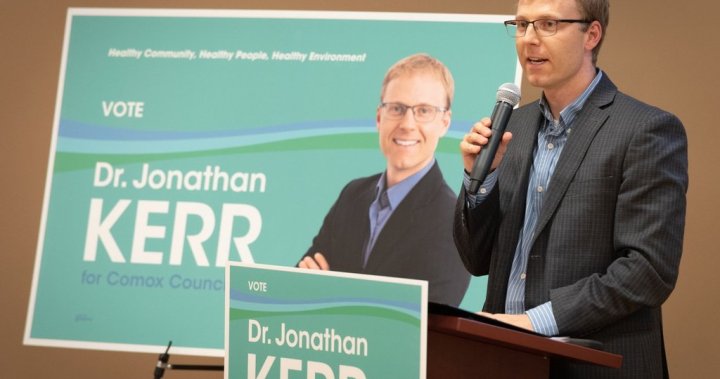A family physician from Vancouver Island has added her name to the growing roster of candidates vying for the BC Green Party leadership, bringing healthcare reform to the forefront of the contest.
Dr. Nicole Obee, who practices in Comox Valley, announced her candidacy Thursday morning, positioning herself as a voice for rural communities and healthcare transformation in a race that now features five contenders.
“I’ve spent fifteen years listening to patients describe how our fragmented systems fail them,” Obee told supporters gathered at a local community garden. “Politicians talk about healthcare solutions while British Columbians continue struggling to find family doctors. I’m stepping up because we need people who understand these systems from the inside.”
Obee joins climate scientist Jonina Campbell, entrepreneur Matt Toner, former MLA candidate Jeremy Valeriote, and Victoria municipal councillor Dave Thompson in the contest to replace outgoing leader Sonia Furstenau, who announced in April she wouldn’t seek re-election in the October provincial vote.
Her entry adds healthcare expertise to a race that has largely focused on environmental policies and economic reform. According to recent Angus Reid polling, healthcare access remains a top concern for 67% of British Columbians, potentially giving Obee’s candidacy particular resonance.
“We’re seeing a fascinating diversity of candidates emerge,” said Gerald Baier, associate professor of political science at UBC. “The Greens are building a broader coalition beyond traditional environmental issues, and Obee represents that evolution toward becoming a more complete political alternative.”
The Comox physician’s platform emphasizes preventative healthcare, climate action as a public health strategy, and revitalization of rural communities. She has previously advocated for innovations like community health centers and integrated care models through her work with Doctors of BC.
“Our healthcare system needs transformation, not just more money thrown at broken structures,” Obee said. “The climate crisis is a health crisis. Housing insecurity is a health crisis. These issues intersect, and the Greens understand these connections better than any other party.”
The BC Green Party holds two seats in the provincial legislature and has been working to expand its influence beyond Vancouver Island. Political analysts suggest Obee’s candidacy might help broaden the party’s appeal in rural and suburban communities where healthcare access has deteriorated.
Party members will select their new leader on September 16, just weeks before British Columbians head to the polls in what promises to be a closely contested provincial election. The BC NDP government under Premier David Eby currently holds a majority, but recent polling from Mainstreet Research suggests a tightening race with Kevin Falcon’s BC Conservatives.
Furstenau has led the Greens since 2020, steering the party through the pandemic and helping establish its identity beyond environmental issues. Her decision not to run again created an opening for new voices within the party.
“This leadership race represents an important moment for the BC Greens,” said Hamish Telford, political scientist at University of the Fraser Valley. “They’re trying to position themselves as more than just an environmental party, and candidates like Obee demonstrate their ambition to address broader social concerns.”
Obee’s campaign team includes several healthcare professionals and environmental advocates from across Vancouver Island. She plans a tour of rural communities throughout the summer, highlighting connections between environmental sustainability, community wellbeing, and public health.
“Healthcare can’t be fixed in isolation,” Obee explained. “When people can’t afford housing, when climate disasters disrupt communities, when mental health services are inaccessible – these all become healthcare crises that land at the feet of our overwhelmed providers.”
Fellow candidate Dave Thompson welcomed Obee to the race, noting that “diverse voices make our party stronger” while Jonina Campbell acknowledged that healthcare would now feature more prominently in leadership debates.
The party has scheduled five leadership debates across the province between July and early September. Membership in the BC Green Party has grown by approximately 30% since the leadership race was announced, according to party officials.
As British Columbia prepares for its October provincial election, the Greens face strategic questions about where to concentrate resources and how to distinguish themselves from the governing NDP and opposition Conservatives.
For Dr. Obee, the answer lies in connecting environmental policy with everyday concerns. “People understand intuitively that a healthy environment means healthy communities,” she said. “The Greens offer solutions that address root causes rather than symptoms, and that’s the approach I’ve always taken as a physician.”






